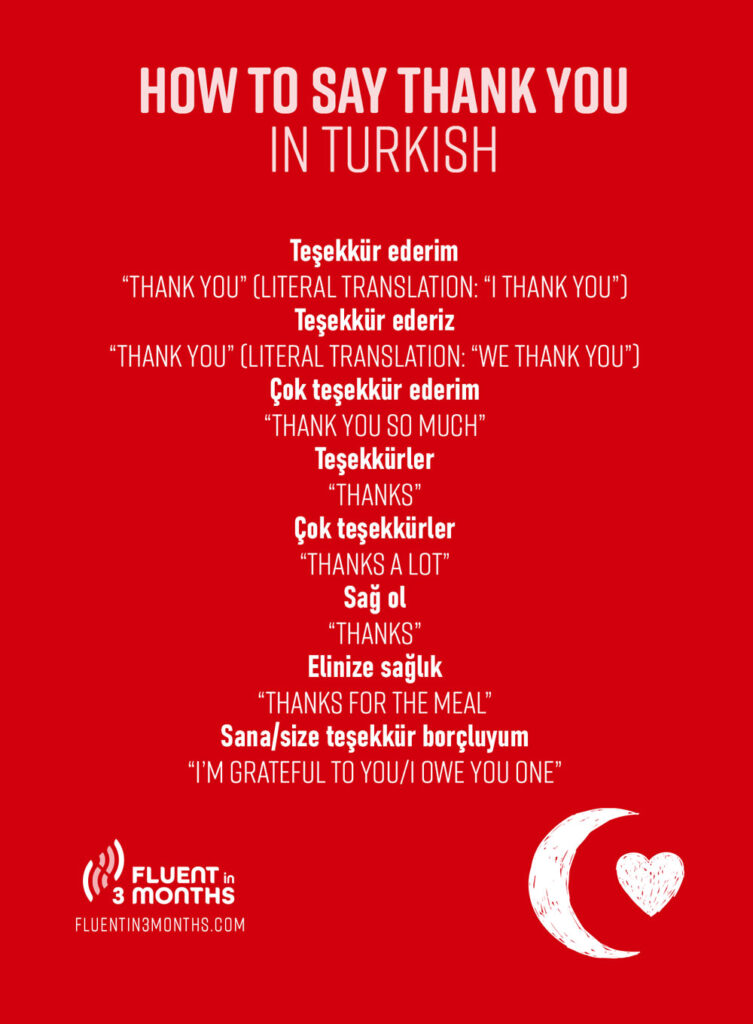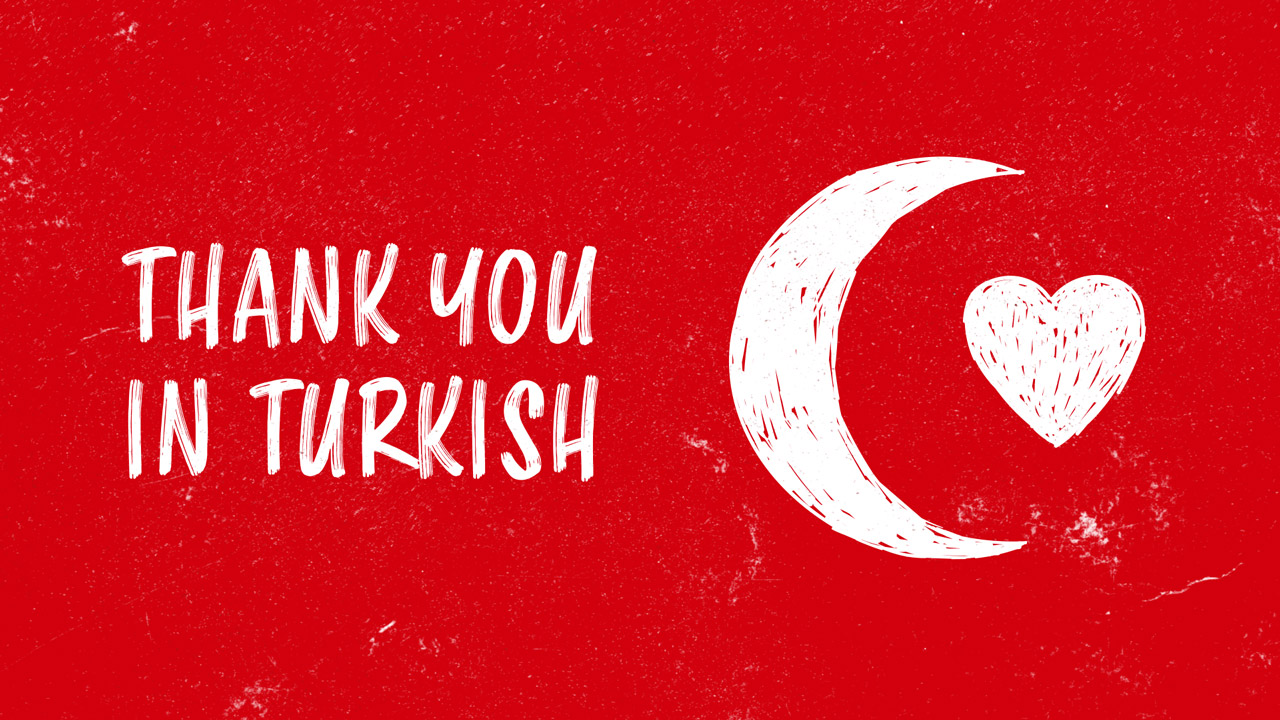How to Say Thank You in Turkish
There are several different ways of saying “thank you” in Turkish — the mainstream teşekkür ederim, the informal sağ ol, and even elinize sağlık, a special phrase used when thanking someone for a meal! Teşekkür ederim works in all cases, but learning about the nuances of different ways to say thanks in Turkish will get you one step closer to fluency.
As a Turkish native speaker, I picked the most common phrases, which we’ll cover one by one. For each phrase, you’ll find examples, their English equivalents, and formal-informal variations:
Table of contents
- How to Say Thank You in Turkish
- Teşekkür Ederim: The Most Common “Thank You” in Turkish
- Çok Teşekkür Ederim: “Thank You Very Much” in Turkish
- Teşekkürler: A More Casual Way to Say “Thanks” in Turkish
- Çok Teşekkürler: “Thanks A Lot” in Turkish
- Sağ Ol: An Informal Way of Saying Thanks
- Elinize Sağlık: A Special Word Used When Thanking Someone for a Meal
- Teşekkür Borçluyum: “I Owe You One” in Turkish
- How to Reply to Thank You in Turkish
- Teşekkür Ederim, Sağ Ol, and Teşekkürler: Say Thanks in Turkish!
But first, here is a quick summary of the Turkish phrases for “thank you:”
| English | Turkish | Audio |
|---|---|---|
| “Thank you” (literal translation: “I thank you”) | Teşekkür ederim | |
| “Thank you” (literal translation: “we thank you”) | Teşekkür ederiz | |
| “Thank you so much” | Çok teşekkür ederim | |
| “Thanks” | Teşekkürler | |
| “Thanks a lot” | Çok teşekkürler | |
| “Thanks” | Sağ ol | |
| “Thanks for the meal” | Elinize sağlık | |
| “I’m grateful to you/I owe you one” | Sana/size teşekkür borçluyum |

How to Say Thank You in Turkish
Now let’s take a more detailed look at the most common phrases that express gratitude in Turkish:
Teşekkür Ederim: The Most Common “Thank You” in Turkish
Teşekkür ederim is the most common way to say “thank you” in Turkish. Its literal translation is “I thank you,” and it can be used in both formal and more casual situations. If you’re thanking someone on behalf of a group, you’ll need to change ederim into ederiz. So it becomes teşekkür ederiz, meaning “we thank you.”
Here are some example sentences — don’t worry if you don’t understand all of them, they’re just here to give more context, especially since the difference of teşekkür ederim and teşekkür ederiz can be quite subtle:
- Teşekkür ederim, bana çok yardımcı oldunuz. – “Thank you, you really helped me.”
- Hediye için teşekkür ederim, gerçekten çok beğendim. – “Thank you for the gift, I really like it”
- Bizi davet ettiğiniz için teşekkür ederiz. Ailem harika zaman geçirdi. – “Thank you for inviting us. My family had a great time.”
Çok Teşekkür Ederim: “Thank You Very Much” in Turkish
When you want to express your gratitude with a little extra emphasis, çok teşekkür ederim is the perfect phrase to use. Çok means “a lot” or “very much,” so çok teşekkür ederim is the equivalent of “thank you very much.”
We can add çok to all the examples above — it will simply enhance the meaning:
- Çok teşekkür ederim, bana çok yardımcı oldunuz. – “Thank you so much, you really helped me.”
- Hediye için çok teşekkür ederim, gerçekten çok beğendim. – “Thank you so much for the gift, I really like it.”
- Bizi davet ettiğiniz için çok teşekkür ederiz. Ailem harika zaman geçirdi. – “Thank you so much for inviting us. My family had a great time.”
Teşekkürler: A More Casual Way to Say “Thanks” in Turkish
Teşekkürler is a more laid-back way to say “thanks” in Turkish. It’s perfect for casual settings, like thanking a friend for a small favor. Although it’s slightly more informal than teşekkür ederim, you can use them interchangeably.
Quick hint: When you say teşekkürler, you don’t have to think about the difference between teşekkür ederim and teşekkür ederiz. So when you’re in doubt, you can safely use teşekkürler!
Here are some new examples:
- Kahve için teşekkürler. – “Thanks for the coffee.”
- Yardımın için teşekkürler. – “Thanks for your help.”
- Hediye için teşekkürler. – “Thanks for the gift.”
Çok Teşekkürler: “Thanks A Lot” in Turkish
Çok teşekkürler means “thanks a lot.” Adding çok makes the meaning of teşekkürler stronger.
In other words, if we use çok teşekkürler instead of teşekkürler, the level of gratitude increases:
- *Kahve için çok teşekkürler. * – “Thanks a lot for the coffee.”
- Yardımın için çok teşekkürler. – “Thanks a lot for your help.”
- Hediye için çok teşekkürler. – “Thanks a lot for the gift.”
Sağ Ol: An Informal Way of Saying Thanks
Sağ ol is a friendly way to say “thank you” in Turkish. It literally translates to “be alive,” but it’s used to say “thanks” in informal situations.
You would mostly use it with friends:
- Beni aradığın için sağ ol. – “Thanks for calling me.”
- Yardımın için sağ ol. – “Thanks for your help.”
If you want to make it more formal or plural, you can say sağ olun.
Elinize Sağlık: A Special Word Used When Thanking Someone for a Meal
Now here is a special one. Elinize sağlık is a unique phrase used to thank someone for a delicious meal, typically one they’ve prepared themselves.
It literally translates to “health to your hands,” which is a way of complimenting the host’s cooking skills and generosity.
Here are some examples to put this phrase into context:
- Elinize sağlık, yemek çok güzeldi. – “Thanks for the meal, it was delicious.”
- Elinize sağlık, beni davet ettiğiniz için teşekkür ederim. – “Thank you for the meal and for inviting me.”
Important note: elinize sağlık is formal. You can use it with your friend’s parents or with older people. Its informal version is eline sağlık.
If a Turkish friend invites you to their place for dinner, say eline sağlık after eating, and they’ll think you’re already fluent!
Teşekkür Borçluyum: “I Owe You One” in Turkish
Teşekkür borçluyum is a phrase you can use when a simple “thank you” doesn’t feel like enough. It roughly translates to “I owe you one,” and it’s a way of acknowledging that you’re grateful for someone’s help or kindness.
Although it’s not as common as the other phrases, here are a few situations where you might hear it:
- Beni Yılmaz Bey’le tanıştırdığınız için size teşekkür borçluyum. – “Thank you for introducing me to Mr Yılmaz. I owe you one.” (formal register)
- Bana İstanbul’da iş bulduğun için sana teşekkür borçluyum. – “Thanks for finding me a job in Istanbul. I owe you one.” (informal register)
How to Reply to Thank You in Turkish
You’ve learned how to express your gratitude in Turkish. But what do you say when someone thanks you?
Just like in English, there are several ways to reply to “thank you” in Turkish, with equivalents of “no problem” and “you’re welcome.”
Bir Şey Değil: The Most Common Way to Say “You’re Welcome”
Bir şey değil is the most standard and widely used response to “thank you” in Turkish. A polite way to acknowledge someone’s gratitude, this phrase translates to “it’s nothing” or “no problem.”
Let’s say you paid for your friend’s coffee, and they said:
Kahve için teşekkür ederim. – “Thank you for the coffee.”
You can reply bir şey değil, “no problem.”
Rica Ederim: The More Formal “You’re Welcome”
Rica ederim is another common way to respond to “thank you” in Turkish, and it’s more formal than bir şey değil. Their differences are similar to those between “no problem” and “you’re welcome.”
Now here is another situation — you helped an old lady carry her luggage in the bus station. She said:
Valizimi taşıdığın için teşekkür ederim. – “Thank you for carrying my luggage.”
You can reply, “rica ederim,” you’re welcome.
Ne Demek: “No Worries” in Turkish
Ne demek is a casual and friendly way to say “no worries.” You can use it with friends or acquaintances.
Sorun Değil: “No Problem” in Turkish
Sorun değil is similar to bir şey değil, and it translates into “no problem” in Turkish. They can be used interchangeably.
Teşekkür Ederim, Sağ Ol, and Teşekkürler: Say Thanks in Turkish!
We covered over 10 different ways of saying thanks in Turkish, and spoiler alert, most of them are used on a daily basis. This means you’re now ready to say thanks in formal circumstances, informal situations, and (I saved the best one for the last) when you’re invited to someone’s place for dinner!
Take a look at our list of Turkish resources for books, tutoring platforms, dictionaries, and pronunciation help.



Social